Since the introduction of the National Action Charter ‘Al-Meethaq’ in 2002, women and men have equal political rights in Bahrain, giving both the right to vote and actively participate in politics. However, female presence in politics is considerably low. In this series we will address the issue of low political presence in Bahrain by dividing the problem into three articles. In “Bahraini Politics: Where Are The Women?”, we will look at the political background in Bahrain and the statistics of women serving in higher positions, as well as compare the country to other Gulf States. In the second part “The Bahraini Society: Challenging Women’s Political Presence” we explain how the male dominant society, religious influences and lack of endorsements by political societies cause women to experience pressure to withdraw from elections or stay away from the political scene, but also to feel hesitant towards participating to begin with. In “Is There Hope For Equal Political Representation?” we show how the popular uprising in 2011, has put women’s rights on a back shelf, and the challenges for both men and women have become more similar and equal, leading to an unclear future for women in politics in Bahrain. Experts and female activists propose some solutions that could gradually improve women’s political presence in Bahrain.
Is there Hope for Equal Political Representation?
Bahrain has already been suffering from political corruption prior to the popular uprising in 2011. When it comes to elections, the government favored individuals loyal to them and helped maximize their chances by simply endorsing them in comparison with government opponents. Latifa Al Qaoud is one of the first two women to ever run for elections. She ran in 2002 in the Southern governante, the same district Mariam Al-Rowaie ran for in the following years. Al Qaoud was named a strong candidate partly because the King’s wife, Sheikha Sabika, publicly expressed her desire to include women in the government. Despite her chances in 2002, she lost to the same religious cleric Jassim Al-Saeedi who went up against Mariam Al-Rowaie in 2006 and 2010. After her loss in 2002, Al Qaoud ran again in 2006 representing a different district, and won. This could be considered a small victory for female politicians, however it must be noted her two opponents had dropped out before the election date, making her the only candidate. The district she ran for was Hawar, an isolated uninhabited island. In 2010 she won again in the same district, but had no competitors during the entire campaign period. Mariam Al-Rowaie, who lost in both 2006 and 2010 elections says Al Qaoud’s breakthrough was a result of the government’s endorsement, which advised her to run in an unpopulated area. Having an expert advice that guides a candidate to maximize their winning opportunities is beneficial, but only few are privileged enough.
A Side Track to Equality
“Before the uprising, one of the challenges for women compared to men was the social barrier. There was always the social stigma or mindset against women. Even if they [men in the society] say they are for equal opportunities, deep inside their heads – and we could feel this in their articles, speeches, election campaigns and discourse of religious clerics – they are not,” explains board member and Deputy Secretary General of National Democratic Action Society (WAAD) Farida Ghulam.
But Bahrain hit a turning point in political development and human rights when it witnessed a popular uprising calling for more freedoms and political reforms. Tensions between opposition and the government started in August 2010, and escalated to a popular uprising in February 2011. Since then, the line between genders have slowly blurred, and the gap between men and women started shrinking until they were almost equally bad.
Women played a significant role in Bahrain’s uprising, standing in the front lines besides the men to demand political and civil rights. The events of the uprising changed the social reality in Bahrain, placing the challenges women had been facing up until the uprising on the shelve. The focus shifted towards addressing shared grievances including human rights violations, political corruption and social divisions. Women’s participation forced a wider acceptance by religious leaders and political societies. They have earned their spot in the society, gaining the support they lacked, and the acknowledgment they missed. However, rising up to being an equal partner in the struggle brought new challenges.
When Muneera Fakhro, Vice President of WAAD, ran for elections in October 2010, her campaign banners were taken down from the streets. The banners said “The mother land is a responsibility, enough corruption” reflecting WAAD’s mission to combat financial and administrative corruption. The municipality responsible for that area informed Fakhro it had received orders from high authorities to remove the banners.
Fakhro says, “now it’s not a matter of gender, it depends on what kind of men or women.” Four year since the uprising, she says the main challenge right now has more to do with whether an individual is a member of the opposition or a government loyalist. Opportunities and chances are presented to those who support the government.
Wajeeha Al-Baharna, president of the Bahrain Women’s Association, notes one of the uprising’s dangerous products is the spread of sectarianism. Sectarianism is an agonizing split between the two main Islamic sects in Bahrain, the Sunnis and the Shiites. In a country where the majority of its population are Shiites ruled by a Sunni royal family, most of them are considered to be anti-government, while most of Sunnis are considered to be government loyalists, of course with some exceptions. “Even women themselves, due to this dispute and sectarian tensions, they are not on the same page anymore. Women are divided. Things have been infected by sectarian disease, and this affects our work on women issues,” Al-Baharna admits.
A study in 2012 on the uprising by Magdalena Karolak echoes the notion of social divisions and splits, and she categorizes people -including women- into pro and anti government groups. She also explained it is difficult to predict how permanent any of the changes are, until they’re tested on the ground after serious political changes take place, leaving the future of women in Bahrain unclear. Karolak claims even though women played a major part in the uprising backing up the democratic movement, they might “find themselves marginalized after the political changes have taken place.”
Need For Policies:
The Supreme Council for Women is an official governmental body whose mission is “to empower Bahraini women and integrate their needs in development to ensure the sustainability of her family stability and familial bond.” Fakhro, who is also one of the founders of the council says although it was a promising initiative for women in Bahrain, the council’s role has become weak. It is technically an extended branch of the government headed by the King’s wife. This makes it exclusive to women preferred and hand picked by the government, and limiting its services to a small group of the society. “It doesn’t harm women, but it doesn’t change anything either. The women in the council will never criticize the government. They’re just an appealing body for the western part of the world to show that our government is modern,” says Fakhro.
However Al-Rowaie thinks the government holds a larger responsibility to craft policies into active laws. “The society will then gradually accept it, because it serves as a credit policy that can be gradually implemented without pausing the process or go backwards,” she says.
Absence of a Quota System
The responsibility doesn’t fall merely on the government’s shoulders, empowering women in civil society is rather a shared responsibility. Women rights activists in Bahrain have been calling for the United Nations recommendation that were adopted at the conference on Women in Beijing, to be implemented and that includes the quota system.
There are three types of gender quotas, two are on the constitutional level which are “reserved seats” and “legal candidate quotas”. While the first sets aside a specific number of seats in the parliament for women, the latter sets a minimum for women’s representation. The third type is a voluntary measure endorsed by political parties to set a minimum for the share of women on the candidate lists. Al-Baharna, whose association, along with other women’s associations, support the quota system says she is surprised despite calls for democracy and gender equality, some political societies don’t take the initiative to implement these measure. Political societies, being the gatekeepers to gender balance in political decision making, play a crucial role. “This is a contradiction, they should review their policy and show more support for women. Its an embedded culture, the men are dominating in these positions, not only in political societies. Their ideas are not reflected on the ground,” Al-Baharna elaborates.
The quota system however raises some concerns to one of the most liberal groups in Bahrain, which did not adopt the quota system. Farida Ghulam of WAAD says there was a split within the group. Some women within the group opposed the idea claiming there is no need to make it a law, instead just work to increase the percentage to half, in alliances with the UN’s recommendation.
But that’s not the only concern, implementing the quota system may do more harm than good says Ghulam, explaining it might pave the way for unqualified candidates to reach the top, and reflect a negative image of women. “We don’t want to vote for women just based on their gender. We want to vote for a person who shares our political interests and goals, whether it is a man or a woman.”
However Al-Baharna refutes this argument claiming there are many qualified women not only in WAAD, but in the entire civil society who could fill these seats. Meanwhile, Mariam Al-Rowaie, who is also the former president of Bahrain Women Union, has an in-between opinion on this measure. She says the quota system is only a tool, and a temporary measure that could help Bahrain take baby steps towards gender equality in politics, but it should not be the only way.
Getting to The Root of The Problem
Bahrain Women’s Association works from within, adopting an inside-out approach to tackle what they believe are the main causes for women’s issues. Women empowerment lies in working on the “roots rather than the symptoms” says Al-Baharna. To have a long term effect on how women see themselves, the association focuses on following a proactive approach rather than fixing the problem later. It starts with the way children are brought up and the ideas and practices they get accustomed to. It’s a problem, she explains, if children open their eyes and realize there is discrimination against women and mothers don’t do anything about it.
“We try to educate women and change their paradigm. Instead of listing their rights, we start with self-esteem and help them build their leadership skills, so they start appreciating themselves and don’t feel inferior.” This method, she believes, strengthens women’s confidence, and prepares them to participate and stand strong against all symptoms. Al-Baharna explains “If the woman believes in herself she will be ready in politics.”
There is Hope
Given that Bahrain is known for its economic growth and women’s’ active role in that field,
the paradox of women being active in the economic sector but not so much in politics is not necessary a bad sign. Former member of Parliament of Alwefaq National Islamic Society Matar Matar concludes that productivity of women in the economic sector is almost equal to that of men’s, and in other sectors women are more productive.
“This economic contribution will automatically have its impact on the nature of this male dominant mindset. This is what makes me optimistic, we will see more representation of women in public affairs,” he says.
Although the 2011 uprising in Bahrain is slowing down the political development and empowerment of women, putting the future on an unpredictable shaky path, hope is still there. When asked about the future of women’s political presence, Al-Baharna took a deep sigh and a moment of silence. “It’s painful to think of the answer, if you had asked me this question in 2010 I would have said it’s a great future.” However she believes Bahrain is unique because of the hardships people go through that is bound to shape the country’s future. “I saw many women from some GCC countries, and asked them, ‘why don’t you demand your right for political participation?’ They ask me ‘why should we?’. The way I see it, money takes over rights.” She explains that Bahrain does not have an oil boom, and the society is not very wealthy. Such conditions make the people more independent and persistent to overcome obstacles and gain their human rights. That serves as an advantage rather than a disadvantage, Al-Bahrana concludes:
“Challenges create opportunities. Unless we have challenges, we will not develop.”
Faten Bushehri is a Bahraini freelance journalist and rights advocate. Global Voices contributor and GV Check Desk editor. Current MA student in media and politics. She tweets at @Fatenhbu.
Anne Koopman is a Dutch Freelance Journalist, currently pursuing MA in Journalism, Media and Globalisation with focus on media and politics. She tweets at @koopman_anne.
The views expressed in this article are the author’s own and do not reflect that of the Bahrain Debate’s organising body.
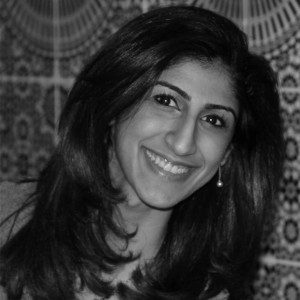
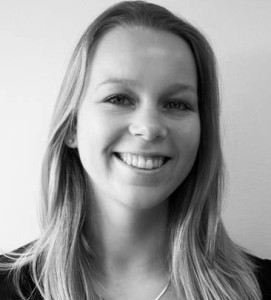

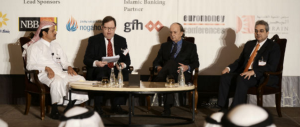
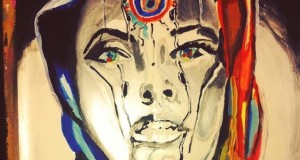
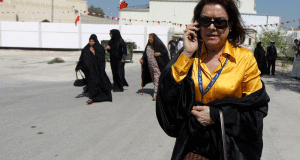
One comment
Pingback: Women’s Political Presence in Bahrain is Still Marginal | A Global voice